Mises, Ludwig von. Human Action: A Treatise on Economics
Подождите немного. Документ загружается.

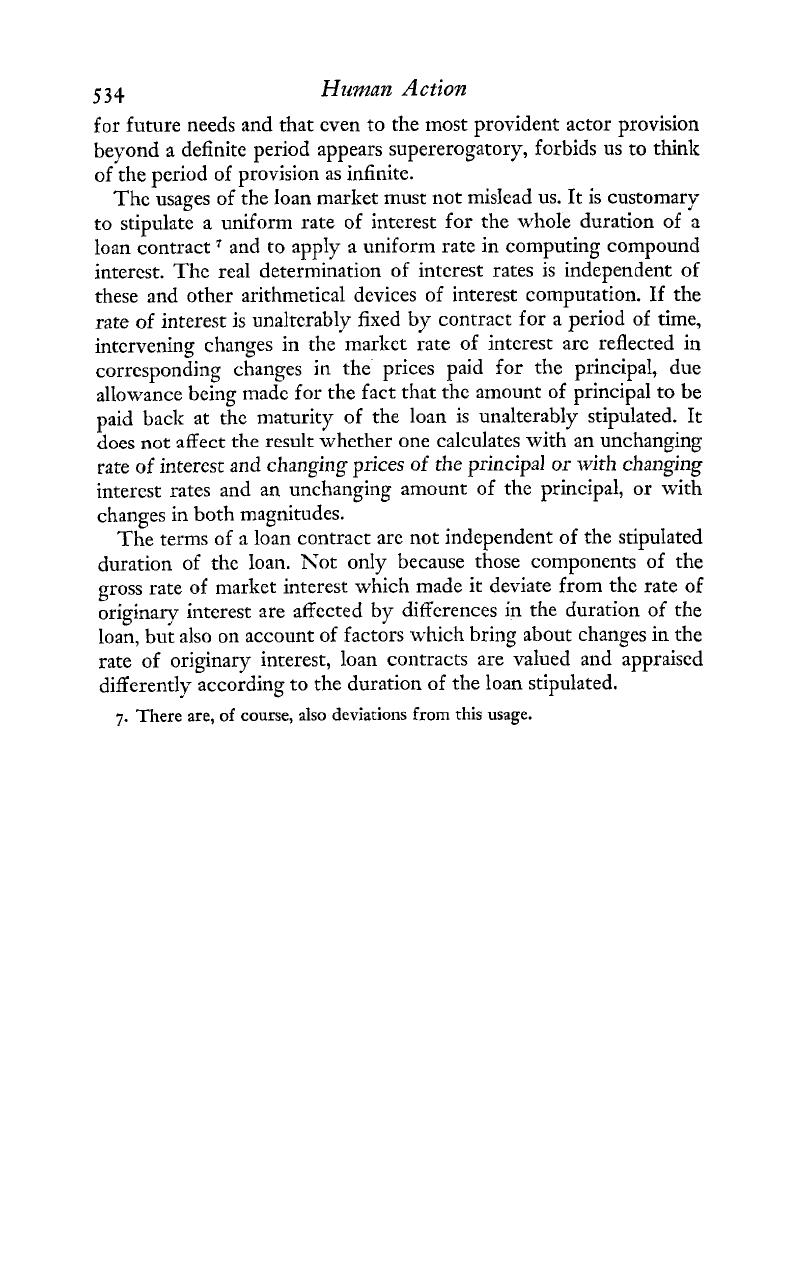
5
34
Human
Action
for future needs and that even to the most provident actor provision
beyond a definite period appears supererogatory, forbids us to think
of the period of provision as infinite.
The usages of the loan market must not mislead us. It is customary
to stipulate a uniform rate of interest for the whole duration of a
loan contract and to apply a uniform rate in computing compound
interest. Thc real determination of intcrest rates is independent of
these and other arithmetical devices of interest computation. If the
rate of interest is unaltcrably fixed by contract for a period of time,
intcrvening changes in the market rate of interest are reflected in
corresponding changes in the prices paid for the principal, due
allowance being rnadc for the fact that the amount of principal to be
paid back at thc maturity of the loan is unalterably stipulated. It
does not affect the result whether one calculates with an unchanging
rate of intercst and changing- prices of
the
principal
or
with
changing
intercst rates and an unchanging amount of the principal, or with
changes in both magnitudes.
The terms of
a
loan contract arc not independent of the stipulated
duration of thc loan. Kot only because those components of the
gross rate of market interest which made it deviate from the rate of
originary interest are affected by differences in the duration of the
loan, but also on account of factors which bring about changes in the
rate of originary interest, loan contracts are valued and appraised
differently according to the duration of the loan stipulated.
7.
There are, of course, also deviations from
this
usage.
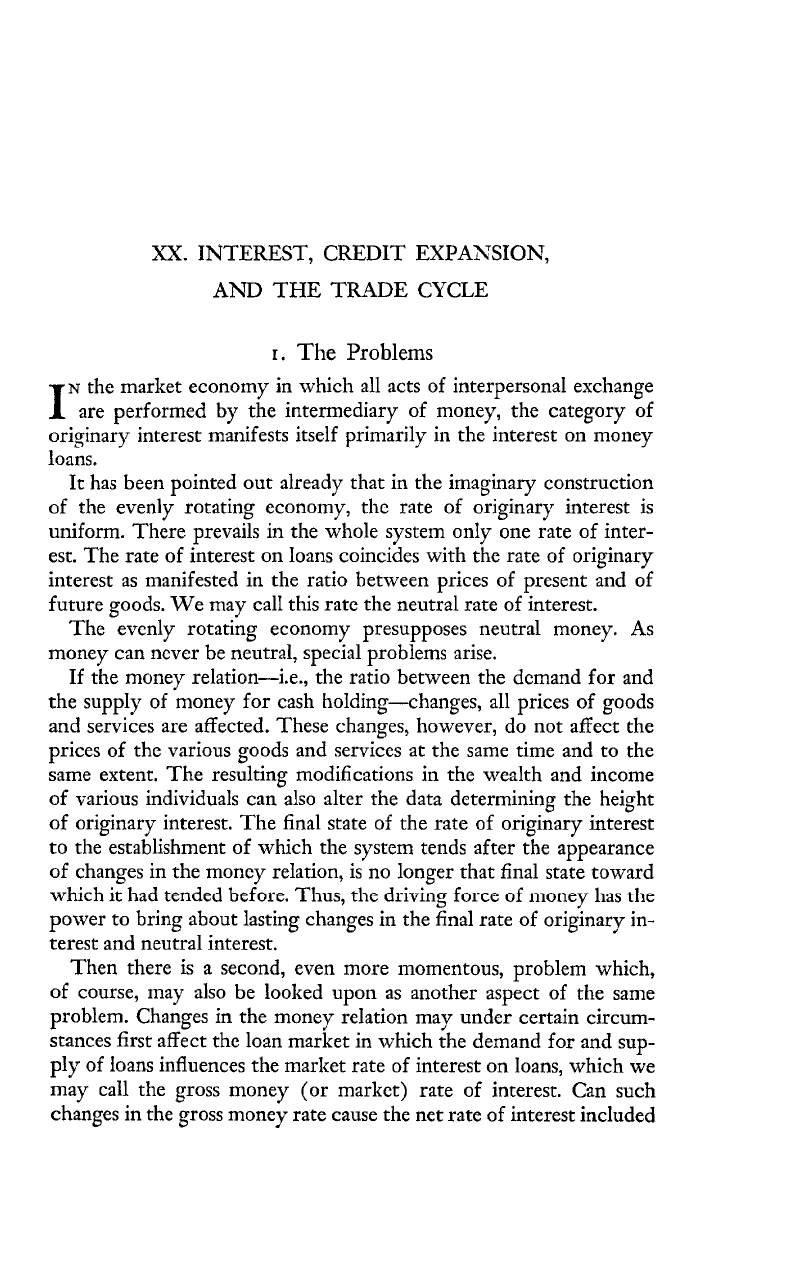
XX.
INTEREST, CREDIT EXPANSION,
AND THE TRADE CYCLE
I.
The
Problems
N
the market economy in which all acts of interpersonal exchange
1
are performed by the intermediary of money, the category of
originary interest manifests itself primarily in the interest on money
loans.
It
has been pointed out already that in the imaginary construction
of the evenly rotating economy, the rate of originary interest is
uniform. There prevails in the whole system only one rate of inter-
est. The rate of interest on loans coincides with the rate of originary
interest as manifested in the ratio between prices of present and of
future goods. We may call this rate the neutral rate of interest.
The evenly rotating economy presupposes neutral money. As
money can never be neutral, special problems arise.
If the money relation-i.e., the ratio between the demand for and
the supply of money for cash holding-changes, all prices of goods
and services are affected. These changes, however, do not affect the
prices of the various goods and services at the same time and to the
same extent. The resulting modifications in the wealth and income
of various individuals can also alter the data determining the height
of originary interest. The final state of the rate of originary interest
to the establishment of which the system tends after the appearance
of changes in the money relation, is no longer that final state toward
-..L:-L
:,
L-2
L---l_J
1__r---
TL.--
&L_
2-:-2--
1
----
-r
-------
L
._
-1.-
WlllCll 1L lldU LGIlUCU UGlUIG. lllUby LlIC UllVlllg IUICC 01 IIIULICY
llab
111C
power to bring about lasting changes in the final rate of originary in-
terest and neutral interest.
Then there is a second, even more momentous, problem which,
of course, may also be looked upon as another aspect of the same
problem. Changes in the money relation may under certain circum-
stances first affect the loan market in which the demand for and sup-
ply of loans influences the market rate of interest on loans, which we
may call the gross money (or market) rate of interest. Can such
changes in the gross money rate cause the net rate of interest included
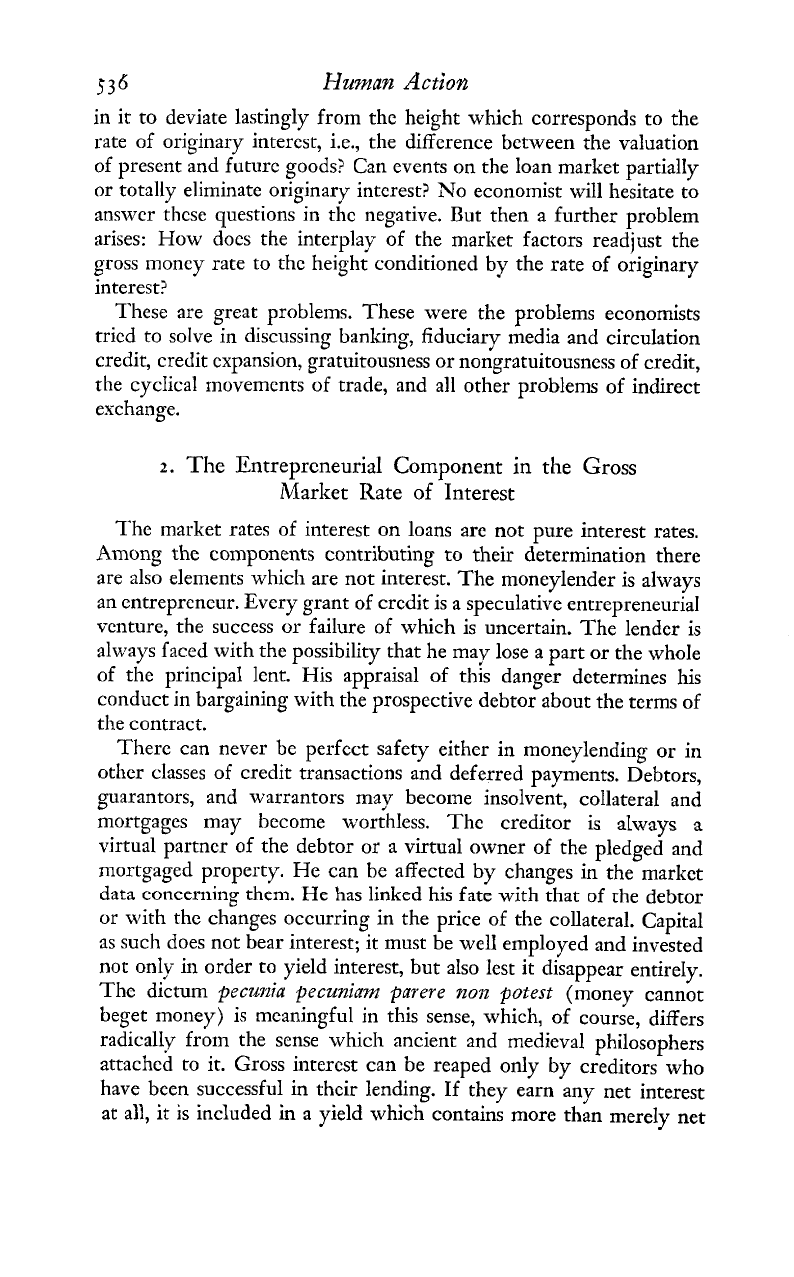
536
Human
Action
in it to deviate lastingly from the height which corresponds to the
rate of originary intercst, i.e., the difference between the valuation
of present and futurc goods? Can events on the loan market partialIy
or totally eliminate originary interest? No economist will hesitate to
answer thcse questions in the negative. But then a further problem
arises: How docs the interplay of the market factors readjust the
gross money rate to the height conditioned by the rate of originary
interest?
These are great problems. These were the problems economists
tricd to solve in discussing banking, fiduciary media and circulation
credit, credit cxpansion, gratuitousness or nongratuitousness of credit,
the cyclical movements of trade, and all other problems of indirect
exchange.
2.
The
Entreprcneurial Component
in
the Gross
Market Rate of Interest
The market rates of interest on loans arc not pure interest rates.
Among the components contributing to their determination there
are also elements which are not interest. The moneylender is always
an entrepreneur. Every grant of credit is a speculative entrepreneurial
venture, the success or failure of which is uncertain. The lender is
always faced with the possibility that he may lose
a
part or the whole
of the principal lent. His appraisal of this danger determines his
conduct in bargaining with the prospective debtor about the terms of
the contract.
There can never be perfect safety either in moneylending or in
other classes of credit transactions and deferred payments. Debtors,
guarantors, and warrantors may become insolvent, collateral and
mortgages may become worthless. The creditor is always
a
virtual partner of the debtor or a virtual owner of the pledged and
mortgaged property. He can be affected by changes in the market
data concerning them.
He
has linked his fate with that of the debtor
or
with the changes occurring in the price of the collateral. Capital
as such does not bear interest; it must be well employed and invested
not only
in
order to yield interest, but also lest it disappear entirely.
The dictum
pecunia pecuniawz parere
non
potest
(money cannot
beget money) is rncaningful in this sense, which, of course, differs
radically fro~n the sense which ancient and medieval philosophers
attached to it. Gross interest can be reaped only by creditors who
have been successful in thcir lending. If they earn any net interest
at all, it is included
in
a yield which contains more than merely net
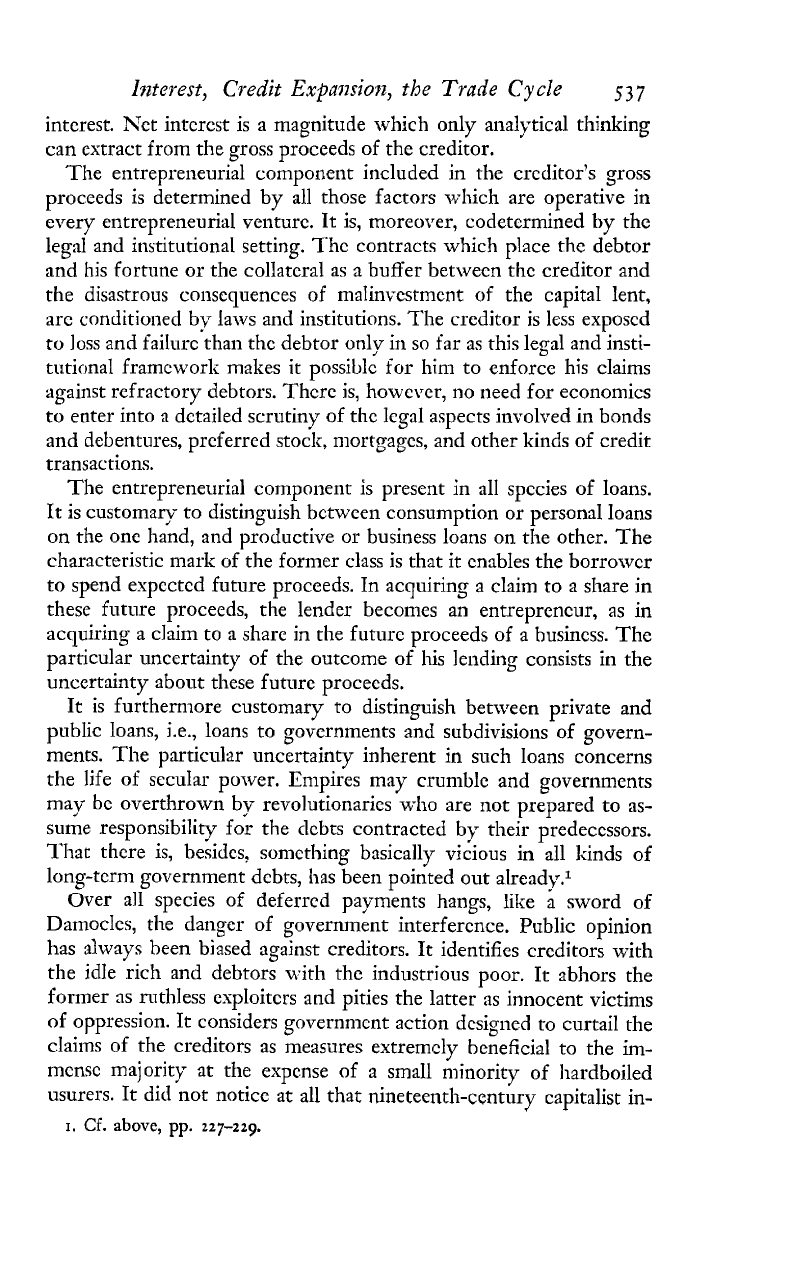
Intewst,
Credit
E.xpamion,
the
Trade
Cycle
5
3
7
interest. Net intcrcst is a magnitude which only analytical thinking
can extract from the gross proceeds of the creditor.
The entrepreneurial component included in the creditor's goss
proceeds is determined by all those factors which are operative in
every entrepreneurial venture. It is, moreover, codetermined by the
legal and institutional setting. The contracts which place the debtor
and his fortune or the collateral as a buffer betwecn the creditor and
the disastrous consequences of maIinvestmcnt
of
the capital lent,
arc conditioned bv laws and institutions. The creditor is less exposcd
to loss and failure'than the debtor only in so far as this legal and insti-
tutional framcwork makes it possiblc for him to enforce his claims
against refractory debtors. Thcrc is, however, no need for economics
to enter into a dctailed scrutiny of thc legal aspects involved in bonds
and debentures, preferred stock, mortgages, and other kinds of credit
transactions.
The entrepreneurial component is present in all species of loans.
It is customary to distinguish bctween consumption or personal loans
on the one hand, and productive or business loans on the other. The
characteristic mark of the formcr class is that it enables the borrorver
to spend expected future proceeds. In acquiring a claim to a share in
these future proceeds, the lender becomes an entrepreneur, as in
acquiring a claim to a share in the futurc proceeds of a
business.
The
particular
uncertainty
of the outcome of his lending consists in the
uncertainty about these future proceeds.
It is furthermore customary to distinguish between private and
public loans, ie., loans to governments and subdivisions of govern-
ments. The particular uncertainty inherent in such loans concerns
the life of secuIar power. Enlpires may crumble and governments
may bc overthrown by revolutionaries who are not prepared to as-
sume responsibility for the clcbts contracted by their predecessors.
That thcre is, besides, something basically vicious in all kinds of
long-term government debts, has been pointed out a1ready.l
Over
all
species of deferred payments hangs, like
a
sword of
DarnocIcs, the danger of government interference. Public opinion
has always heen biased against creditors.
It
identifies creditors with
the idle rich and debtors with the industrious poor. It abhors the
former as ruthless esploitcrs and pities the latter as innocent victims
of oppression. It considers government action designed to curtail the
claims of the creditors as measures extremcly beneficial to the im-
mcnsc majority at the expense of a small minority of hardboiled
usurers. It did not notice at all that nineteentb-century capitalist in-
I.
Cf.
above,
pp.
227-229.
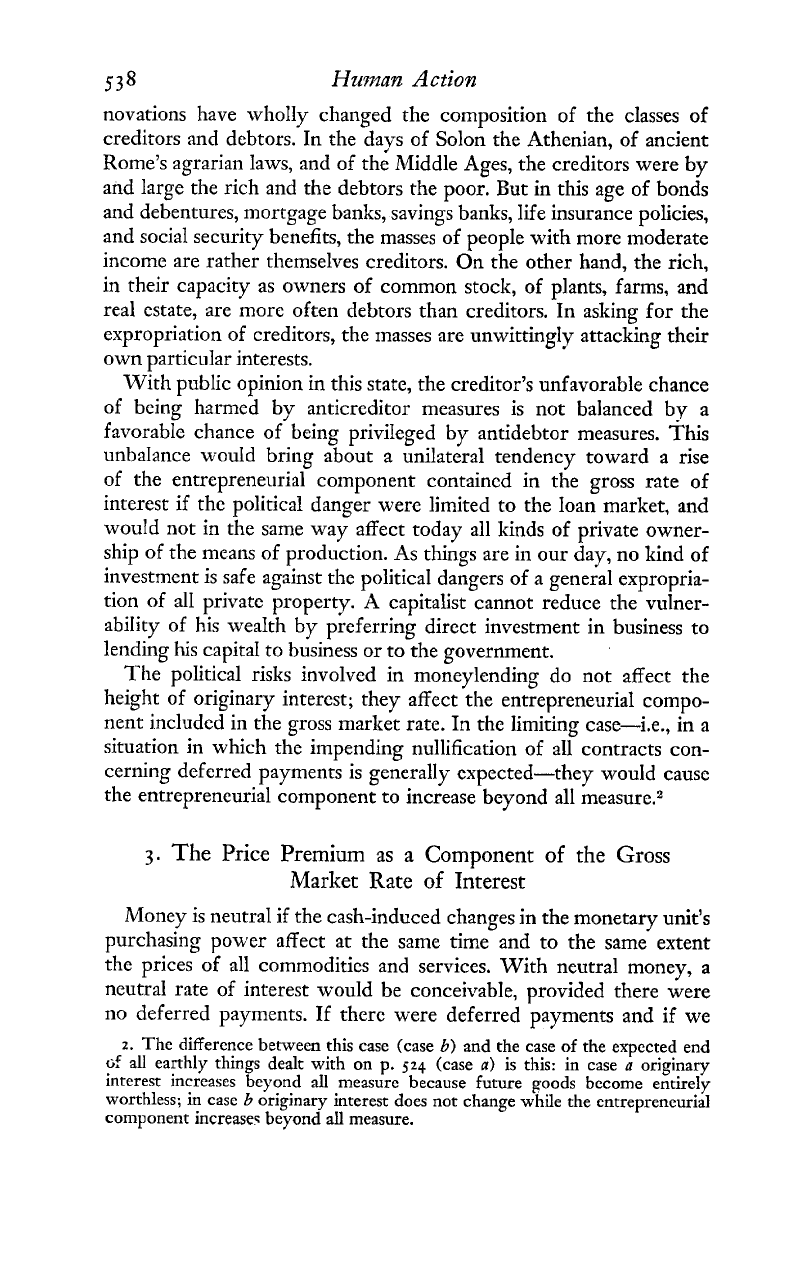
538
Human
Action
novations have wholly changed the composition of the classes of
creditors and debtors. In the days of Solon the Athenian, of ancient
Rome's agrarian laws, and of the Middle Ages, the creditors were by
and large the rich and the debtors the poor. But in this age of bonds
and debentures, mortgage banks, savings banks, life insurance policies,
and social security benefits, the masses of people with more moderate
income are rather themselves creditors. On the other hand, the rich,
in their capacity as owners of common stock, of plants, farms, and
real estate, are more often debtors than creditors. In asking for the
expropriation of creditors, the masses are unwittingly attacking their
own particular interests.
With public opinion in this state, the creditor's unfavorable chance
of being harmed by anticreditor measures is not balanced by a
favorable chance of being privileged by antidebtor measures. This
unbalance would bring about a unilateral tendency toward a rise
of the entrepreneurial component contained in the gross rate of
interest if the political danger were limited to the loan market, and
would not in the same way affect today all kinds of private owner-
ship of the means of production. As things are in our day, no kind of
investment is safe against the political dangers of a general expropria-
tion of all private property. A capitalist cannot reduce the vulner-
ability of his weaIth by p;eferring direct investment in business to
lending his capital to business or to the government.
The political risks involved in moneylending do not affect the
height of originary interest; they affect the entrepreneurial compo-
nent included in the gross market rate. In the limiting case-i.e., in a
situation in which the impending nullification of all contracts con-
cerning deferred payments is generally expected-they would cause
the entrepreneurial component to increase beyond all meas~re.~
3.
The Price Premium as
a
Component
of
the
Gross
Market Rate
of
Interest
Money is neutral if the cash-induced changes in the monetary unit's
purchasing power affect at the same time and to the same extent
the prices of all commodities and services. With neutral money, a
neutral rate of interest would be conceivable, provided there were
no deferred payments. If there were deferred payments and if we
2.
The difference between this case (case
b)
and the case of the expected end
rif
all earthly things dealt with on p.
524
(case
a)
is this: in case
a
originary
interest increases beyond all measure because future goods become entirely
worthless; in case
b
originary interest does not change while the entrepreneurial
component increase beyond
all
measure.
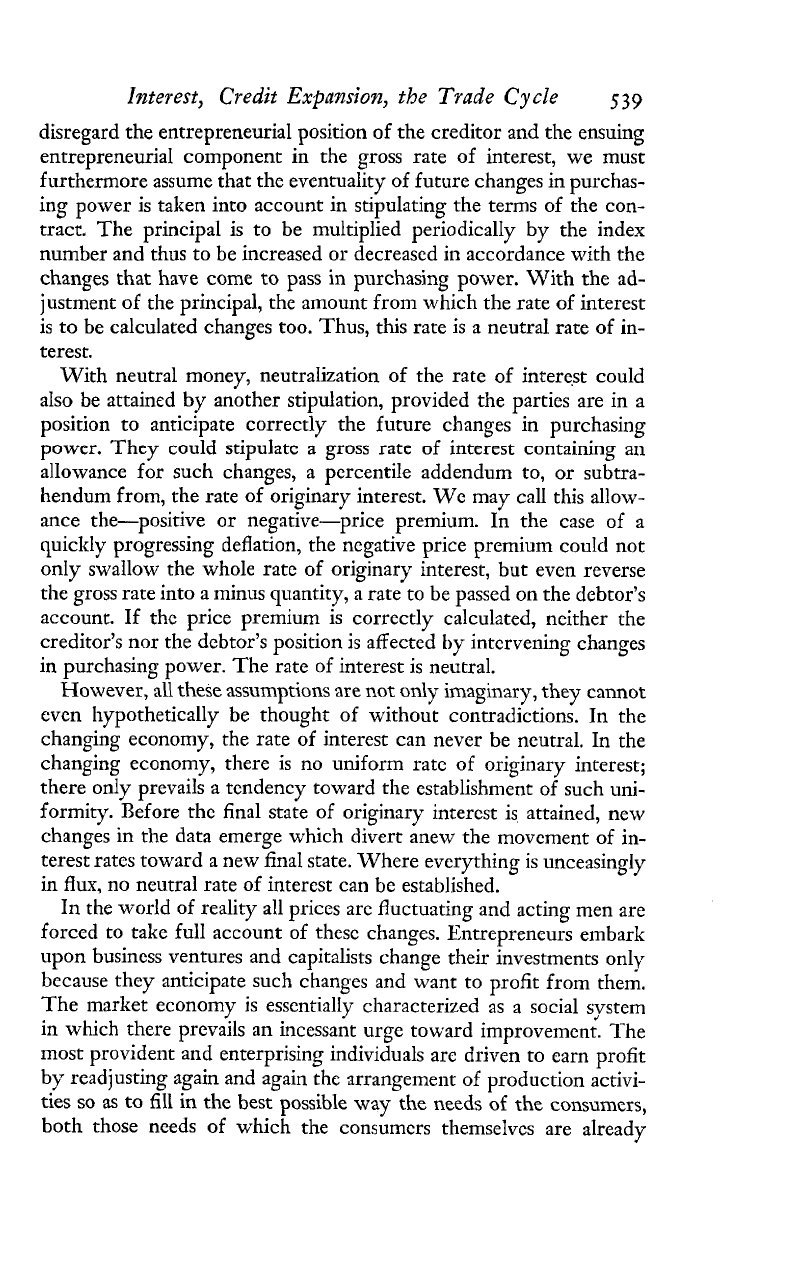
Interest, Credit Expansion, the Trade Cycle
539
disregard the entrepreneurial position of the creditor and the ensuing
entrepreneurial component in the gross rate of interest, we must
furthermore assume that the eventuality of future changes in purchas-
ing power is taken into account in stipulating the terms of the con-
tract. The principal is to be multiplied periodically by the index
number and thus to be increased or decreased in accordance with the
changes that have come to pass in purchasing power. With the ad-
j
ustment of the principal, the amount from which the rate of interest
is to be calculated changes too. Thus, this rate is a neutral rate of in-
terest.
With neutral money, neutralization of the rate of interest could
also be attained by another stipulation, provided the parties are in a
position to anticipate correctly the future changes in purchasing
power. They could stipulate
a
gross rate of interest containing an
allowance for such changes, a percentile addendum to, or subtra-
hendum from, the rate of originary interest. We may call this allow-
ance the-positive or negative-price premium. In the case of a
quickly progressing deflation, the negative price premium could not
only swallow the whole rate of originary interest, but even reverse
the gross rate into a minus quantity, a rate to be passed on the debtor's
account. If the price premium is correctly calculated, neither the
creditor's nor the debtor's position is affected
by
intervening changes
in purchasing power. The rate of interest is neutral.
However, all these assumptions are not only imaginary, they cannot
even hypothetically be thought of without contradictions. In the
changing economy, the rate of interest can never be neutral. In the
changing economy, there is no uniform rate of originary interest;
there only prevails a tendency toward the establishment of such mi-
formity. Before the final state of originary interest is attained, new
changes in the data emerge which divert anew the movement of in-
terest rates toward a new final state. Whcre everything is unceasingly
in flux, no neutral rate of interest can be established.
In the world of reality all prices are fluctuating and acting men are
forced to take full account of these changes. Entrepreneurs embark
upon business ventures and capitalists change their investments only
because they anticipate such changes and want to profit from the&.
The market economy is essentially characterized as a social systcm
in which there prevails an incessant urge toward improvement. The
most provident and enterprising individuals are driven to earn profit
by readjusting again and again the arrangement of production activi-
ties so
as
to
fill
in the best possible way the needs
of
the consumers,
both those needs of which the consumers themselvcs are already
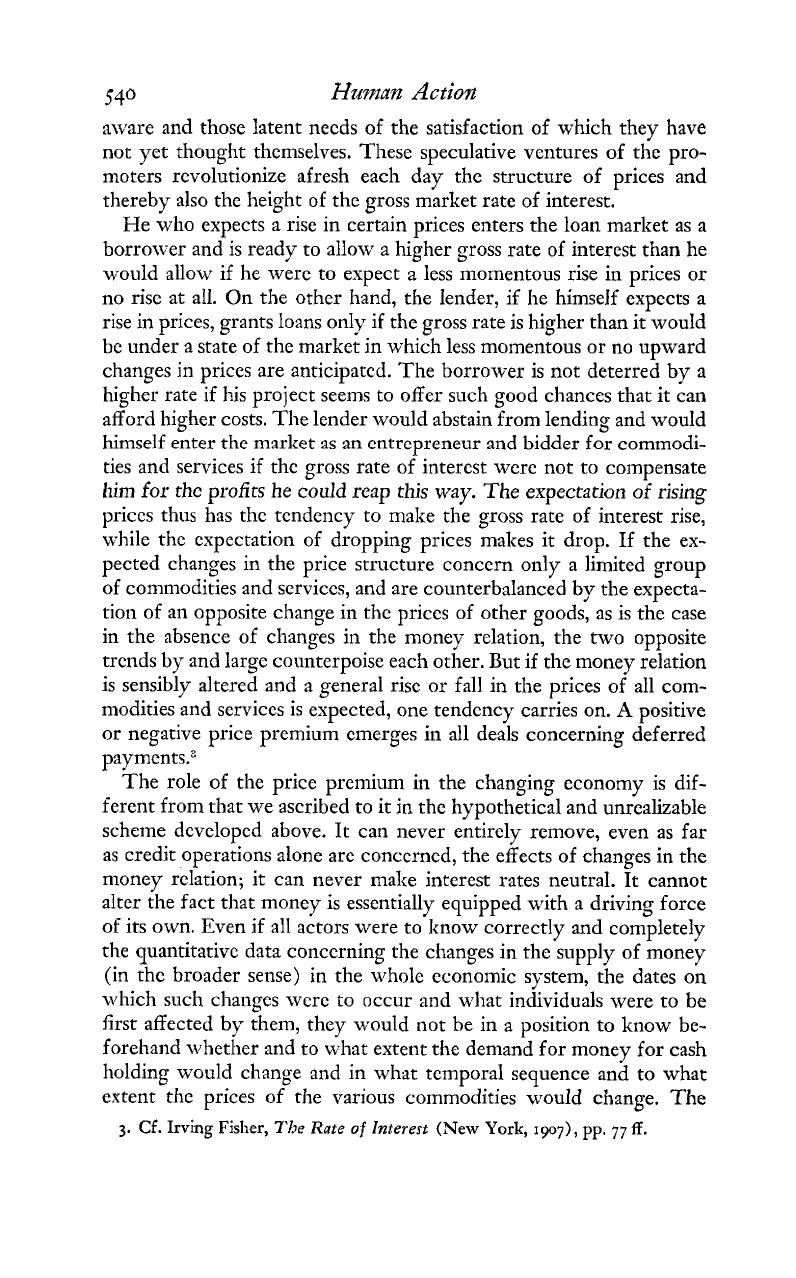
aware and those latent needs of the satisfaction of which they have
not yet thought thcmselves. These speculative ventures of the pro-
moters revolutionize afresh each day the structure of prices and
thereby also the height of the gross market rate of interest.
He who expects a risc in certain prices enters the loan market as a
borrower and is ready to allow
a
higher gross rate of interest than he
would allow if he were
to
expect
a
less momentous rise in prices or
no risc at all. On the other hand, the lender, if he himself expects a
rise in prices, grants Ioans only if the gross rate is higher than it would
be under a state of the market in which less momentous or no upward
changes in prices are anticipated. The borrower is not deterred by a
higher rate if his project seems to offer such good chances that it can
afford higher costs. The lender would abstain from lending and would
himself enter the market as an cntrcpreneur and bidder for commodi-
ties and services if the gross rate of interest were not to compensate
him
for the profits he
could
reap this
way.
The expectation of
rising
prices thus has thc tendency to make the gross rate of interest rise,
while the expectation of dropping prices makes it drop. If the ex-
pected changes in the price structure concern only a limited group
of commodities and services, and are counterbalanced by the expecta-
tion of an opposite change in the prices of other goods, as is the case
in the absence of changes in the money relation, the two opposite
trends by and large counterpoise each other. But if the money relation
is sensibly altered and a general rise or fall in the prices of all com-
modities and services is expected, one tendency carries on.
A
positive
or negative price premium emerges
in
all deals concerning deferred
payments.'
The role of the price premium in the changing economy is dif-
ferent from that we ascribed to it in the hypothetical and unrealizable
scheme developed above. It can never entircly remove, even as far
as credit operations alone are concerned, the effects of changes in the
money relation; it can never make interest rates neutral. It cannot
alter the fact that money is essentially equipped with a driving force
of its own. Even if all actors were to know correctly and completely
the quantitative data concerning the changes
in
the supply of money
(in the broader sense) in the whole economic system, the dates on
which such changes were to occur and what individuals were to be
first affected by them, they would not be in
a
position to know be-
forehand whether and to what extent the demand for money for cash
holding would change and in what temporal sequence and to what
extent the prices of the various commodities would change. The
3.
Cf.
Irving Fisher,
The Rate
of
Interest
(New
York, 19071,
pp.
77
ff.
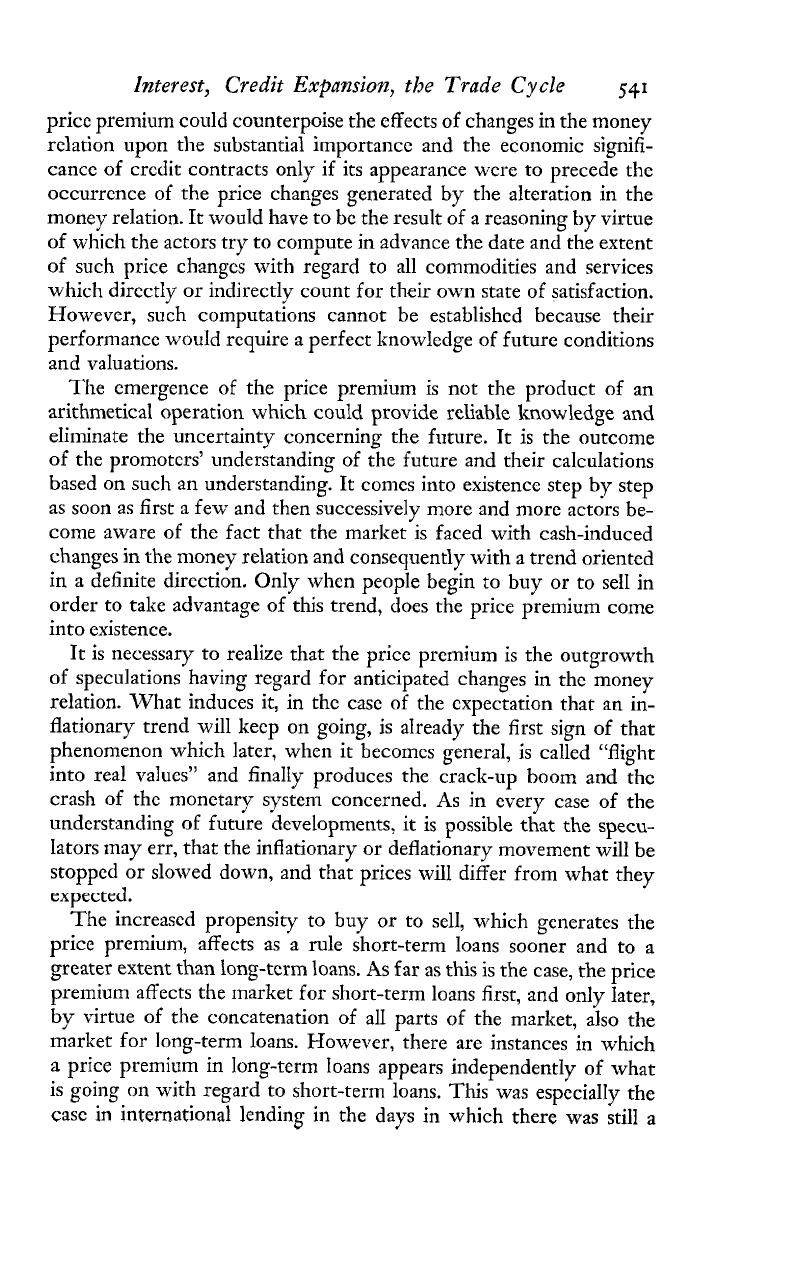
Interest, Credit Expansion, the Trade Cycle
541
price premium could counterpoise the effects of changes in the money
relation upon the substantial importance and the economic signifi-
cance of crcdit contracts only if its appearance were to precede the
occurrence of the price changes generated by the alteration in the
money relation. It would have to be the rcsult of a reasoning by virtue
of which the actors try to compute in advance the date and the extent
of such price changes with regard to all commodities and services
which dircctly or indirectly count for their own state of satisfaction.
However, such computations cannot be established because their
performance would require a perfect knowledge of future conditions
and valuations.
?he emergence of the price premium is not the product of an
arithmetical operation which could provide
reliable
knowledge
and
eliminate the uncertainty concerning the future. It is the outcome
of the promoters' understanding of the future and their calculations
based on such an understanding. It comes into existencc step by step
as soon as first a few and then successively more and more actors be-
come aware of the fact that the market is faced with cash-induced
changes in the money relation and consequently with a trend oriented
in
a
definite direction. Only when people begin to buy or to sell in
order to take advantage of this trend, does the price premium come
into existence.
It is necessary to realize that the price premium is the outgrowth
of speculations having regard for anticipated changes in the money
relation. What induces it, in the case of the expectation that an in-
flationary trend will keep on going, is already the first sign of that
phenomenon which later, when it becomes general, is called "flight
into real values" and finally produces the crack-up boom and the
crash of thc monetary system concerned. As in every case of the
understanding of future hevelopments, it is possible that
the
specu-
lators may err, that the inff ationary or deflationary movement will be
stopped or slowed down, and that prices will differ from what they
expected.
The increased propensity to buy or to sell, which generates the
price premium, affects as a rule short-term loans sooner and to
a
greater extent than long-term loans.
As
far as this is the case, the price
premium affects the market for short-term loans first, and only later,
by virtue of the concatenation of all parts of the market, also the
market for long-term loans. However, there are instances
in
which
a price premium in long-term loans appears independently of what
is going on with regard to short-term loans. This was especialIy the
case
in
international lending in the days in which there was still
a
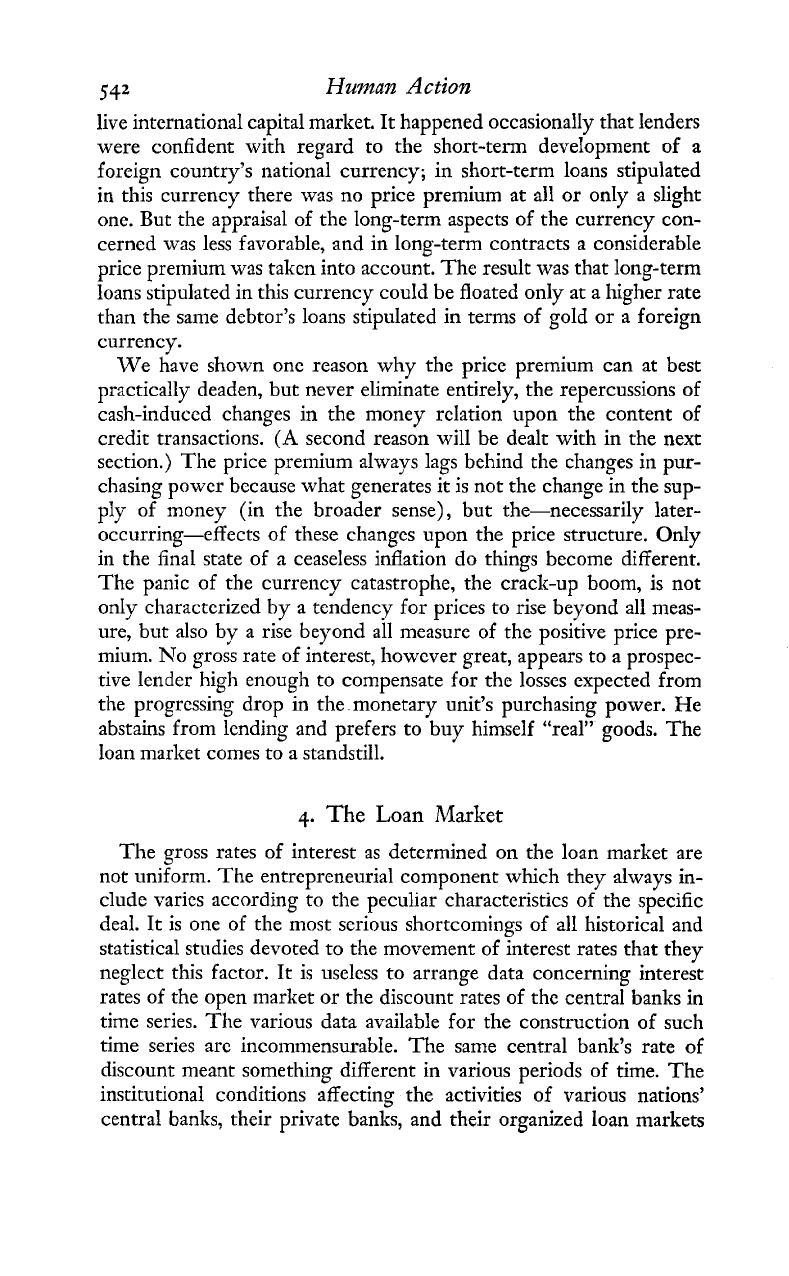
542
Human
Action
live international capital market. It happened occasionally that lenders
were confident with regard to the short-term deveIopment of
a
foreign country's national currency; in short-term loans stipulated
in this currency there was no price premium at all or only a slight
one. But the appraisal of the long-term aspects of the currency con-
cerned was less favorable, and in long-term contracts
a
considerable
price premium was taken into account. The result was that long-term
loans stipulated in this currency could be floated only at a higher rate
than the same debtor's loans stipulated in terms of gold or a foreign
currency.
We have shown one reason why the price premium can at best
practically deaden, but never eliminate entirely, the repercussions of
cash-induced changes in the money relation upon the content of
credit transactions.
(A
second reason will be dealt with in the next
section.) The price premium always lags behind the changes in pur-
chasing power because what generates it is not the change in the sup-
ply of money (in the broader sense), but the-necessarily later-
occurring-effects of these changes upon the price structure. Only
in the final state of a ceaseless inflation do things become different.
The panic of the currency catastrophe, the crack-up boom, is not
only characterized
by
a tendency for prices to rise beyond all meas-
ure, but also by a rise beyond ail measure of the positive price pre-
mium. hTo gross rate of interest, however great, appears to a prospec-
tive lender high enough to compensate for the losses expected from
the progressing drop in the monetary unit's purchasing power. He
abstains from lending and prefers to buy himself "real" goods. The
loan market comes to a standstill.
4.
The
Loan Market
The gross rates of interest as determined on the loan market are
not uniform. The entrepreneurial component which they always in-
ciude varies according to the pecuiiar characteristics of the specific
deal. It is one of the most serious shortcomings of all historical and
statistical studies devoted to the movement of interest rates that they
neglect this factor. It is useless to arrange data concerning interest
rates of the open ~narket or the discount rates of the central banks in
time series. The various data available for the construction of such
time series are incommensurable. The same central bank's rate of
discount meant something different in various periods of time. The
institutional conditions affecting the activities of various nations'
central banks, their private banks, and their organized loan markets
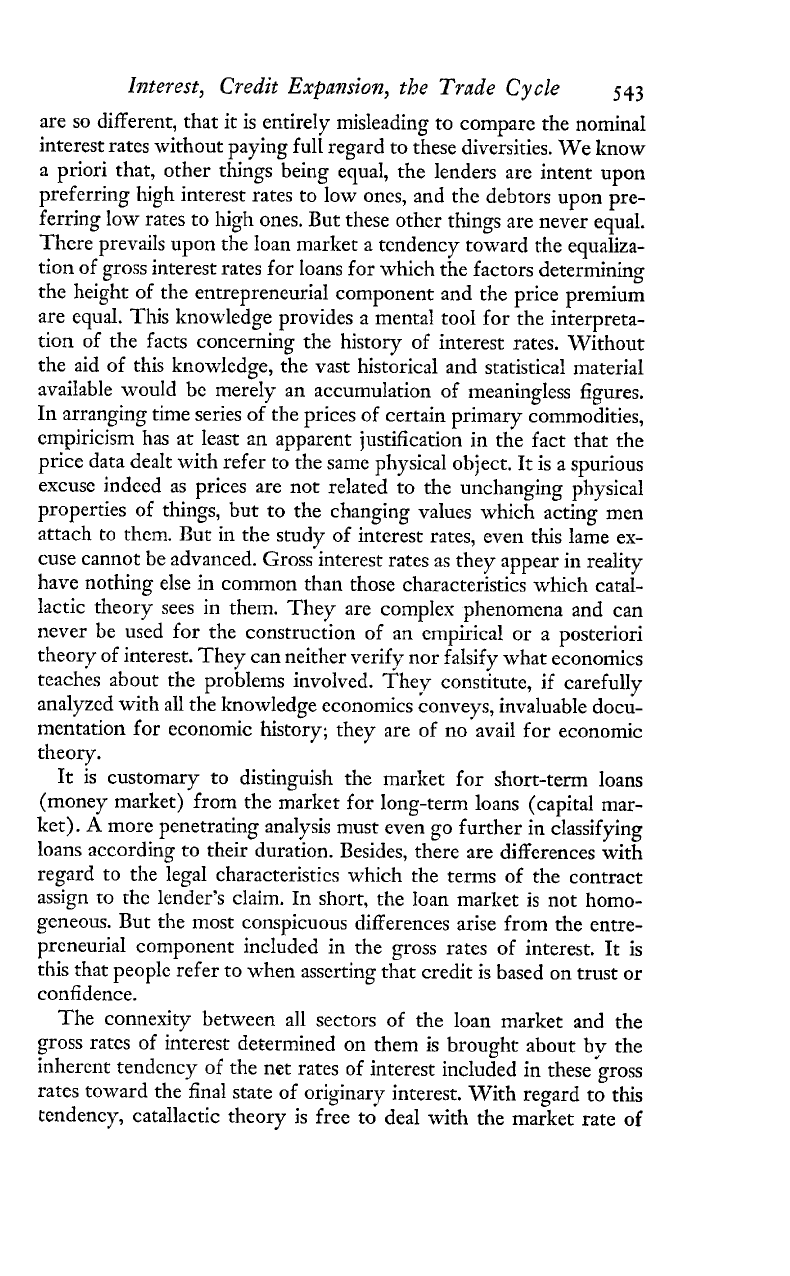
Interest, Credit Expansion, the Trade Cycle
543
are so different, that it is entirely misleading to compare the nominal
interest rates without paying full regard to these diversities. We know
a priori that, other things being equal, the lenders are intent upon
preferring high interest rates to low ones, and the debtors upon pre-
ferring low rates to high ones. But these other things are never equal.
There prevails upon the loan market a tendency toward the equaliza-
tion of gross interest rates for loans for which the factors determining
the height of the entrepreneurial component and the price premium
are equal. This knowledge provides a mental tool for the interpreta-
tion of the facts concerning the history of interest rates. Without
the aid of this knowledge, the vast historical and statistical material
available would be merely an accumulation of meaningless figures.
In arranging time series of the prices of certain primary commodities,
empiricism has at least an apparent justification in the fact that the
price data dealt with refer to the same physical object. It is a spurious
excuse indeed as prices are not related to the unchanging physical
properties of things, but to the changing values which acting men
attach to them. But in the study of interest rates, even this lame ex-
cuse cannot be advanced. Gross interest rates as they appear in reality
have nothing else in common than those characteristics which catal-
lactic theory sees in them. They are complex phenomena and can
never be used for the construction of an empirical or a posteriori
theory of interest. They can neither verify nor falsify what economics
teachis about the problems involved. They constitute, if carefully
analyzed with all the knowledge economics conveys, invaluable docu-
mentation for economic history; they are of no avail for economic
theory.
It is customary to distinguish the market for short-term loans
(money market) from the market for long-term loans (capital mar-
ket).
A
more penetrating analysis must even go further in classifying
loans according to their duration. Besides, there are differences with
regard to the legal characteristics which the terms of the contract
assign to the iender's ciaim. in short, the ioan market is not homo-
geneous. But the most conspicuous differences arise from the entre-
preneurial component included in the gross rates of interest. It is
this that people refer to when asserting that credit is based on trust or
confidence.
The connexity between all sectors of the loan market and the
gross rates of interest determined on them is brought about
by
the
inherent tendency of the net rates of interest included in these gross
rates toward the final state of originary interest. With regard to this
tendency, catallactic theory is free
td
deal with the market rate of
